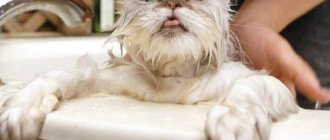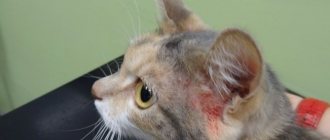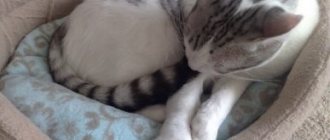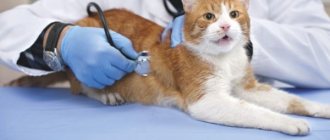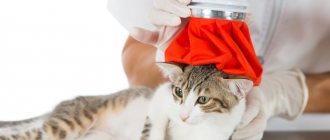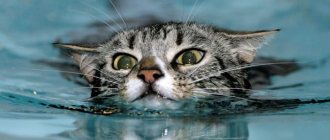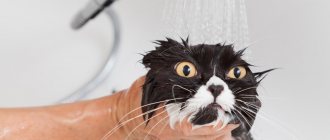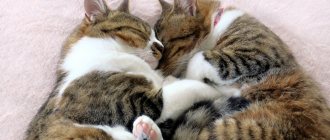Water procedures should be carried out regularly. Moreover, regardless of whether the pet has the opportunity to go outside or not. True, sometimes you have to perform such actions unscheduled, and the hygiene product runs out at the most inopportune moment.
It’s worth figuring out how to wash your cat if there is no special shampoo, and what you can replace it with.
When should a cat be washed?
The need for water procedures may arise in different cases.
Lots of fleas
If an animal is infected with parasites, treatment should be carried out without delay.
True, you won’t be able to rid your kitten of fleas using regular shampoo. You need to use special products designed for pest control at home.
Contaminated with toxic substances
If toxic substances come into contact with a cat's fur, bathing is mandatory.
It cannot be postponed, otherwise irreparable harm may be caused to the pet’s health.
Other reasons
There are a number of other cases when you need to bathe your pet:
preparation for the exhibition;- severe contamination of the coat;
- period of intense molting;
- strong unpleasant odor from the cat.
Preparing to wash your cat
Trim your cat's nails to prevent him from scratching you while bathing.
Comb the fur and remove tangles.
Choose a place for bathing - a bathtub, sink or basin. The bathtub is perfect for large cats; you just need to cover the bottom with non-slip bedding. Many owners wash their pets in sinks. The option with a basin is less convenient, since the cat may begin to grab onto its edges; give preference to a container with a volume of about 30 liters or buy a special bath.
Remove all foreign objects from the sides of the bathtub or sink, hide washcloths and other things that the cat can get caught on.
Make sure you have everything you need to bathe your pet on hand:
- shampoo selected specifically for cats (laundry soap and detergents are not suitable for humans - cats have a different skin Ph);
- a hat that covers the cat's ears, or cotton swabs that can be placed in the ears, or you can tie a small bag on your head like a scarf;
- soft washcloth for washing hair;
- a large towel in which to wrap the cat after washing so that it does not freeze and cannot scratch you;
- standard towel for collecting remaining moisture and drying;
- caring assistant (preferably).
We invite you to read: How to open a horse breeding business: business idea, how to open, investments, equipment, what you need to open, real cases
Check the temperature in the room where you are going to wash your cat. Pets can easily become hypothermic and get sick, so the air should be no colder than 22 °C.
Pour water into the bathtub, basin or sink in advance. The cat is more afraid not of the bath itself, but of the sound of water pouring from the tap. Before starting water procedures, add warm water to a level of about 10 cm so that the water reaches the cat’s belly. The animal must stand confidently on its paws, but so that its head does not get wet.
Some purebred cats have coat characteristics that affect their care. In general, we can say that long-haired cats need to be washed more often than short-haired cats.
A common myth concerns Sphynx cats - supposedly because of their oily skin they need to be washed once a week. In fact, it is better to wipe the Sphynx with wet wipes or a soft cloth, and bathe it only if it is very dirty.
The Burmese cat has a very impressive, shiny, short coat, the beauty of which must be maintained. Instead of washing fine fur, which can make your cat look like a hedgehog, wipe it daily with a piece of suede or a damp cloth. This will help give the “fur coat” a glossy shine. Once a week, the cat should be combed with a mitten or brush. You can use a special cat antistatic agent. Your chocolate will definitely love this massage!
British cats and Maine Coons have sensitive skin, so it is extremely important for them to select specialized shampoos based on their coat type. From low-quality cosmetics, cats can begin to constantly itch and develop dandruff.
Soap or shampoo for people: are they suitable for cats?
You can use soap. In emergency situations, the use of this product is acceptable, but it is necessary to choose brands that do not emit a strong aroma. It is recommended to give preference to baby soap.
Regular shampoo is not the best solution. It is allowed to be used only once. At the same time, you need to try not to soap the animal too much. It is best to make a weak soap solution and treat your pet with it, then rinse immediately.
What happens if the animal is regularly washed with a non-special product?
The systematic use of shampoos that are unsuitable for cats leads to changes in the structure of the hairs, the activity of the fatty glands is disrupted, and the condition of the skin deteriorates .
The development of allergies cannot be ruled out. Because of this, the immune system weakens. The pet becomes more susceptible to various diseases.
Shampoo substitutes for cats
If washing needs to be done immediately, and there is no special shampoo, you can use those products that are intended for children. They do not contain fragrances, surfactants or chemicals that can cause harm.
Products that meet the following requirements are considered suitable for pets:
simple composition;- absence of allergenic components;
- The smell is weak, neutral.
Preference should be given to shampoos intended for children under three years of age.
Such products act gently and as carefully as possible. With their help, it is possible to clean the fur and skin without causing harm to the animal.
Why are unscheduled water treatments needed?
There are several cases when there is a need, even a necessity, to bathe your pet, despite the fact that you do not know what you can use to wash the cat if there is no special shampoo. In the end, you use what you have at hand:
- if the cat is purebred and participates in all sorts of competitions and exhibitions, then before each such event, breeders usually wash such pets;
- in the case of some severe contamination that the cat cannot lick on its own, or which has toxic properties and the animal, while licking itself, can be poisoned;
- as we have already mentioned, with heavy shedding, this can harm the digestion of a mustachioed cat, especially for long-haired cats.
Important! Another nuance is caring for the animal in summer and autumn. Here you will find useful information on how to remove fleas from a cat.
Types of cat cleaning products
All products intended for cats can be divided into three groups:
- liquid;
- dry;
- sprays.
Each type has both advantages and disadvantages. Therefore, it is worth considering them in more detail.
Liquid shampoos
Considered the standard view.
High-quality products not only clean the coat, but also make it silky and soft. There are both general and specialized ones: against tangles, against fleas, etc. Shampoos should be used up to three times a year. Their more frequent use can lead to disruption of the sebaceous glands.
Dry products
Preference is given to such options if the pet is terribly afraid of water.
Dry products cope with the task assigned to them as effectively as liquid ones. In addition, their use makes combing easier.
Cat fur takes a long time to dry. The slightest draft can lead to a cold. In addition, you need to make sure that water does not get into your ears.
If dry powder is used, these problems do not arise. Even with frequent use, the skin does not dry out.
Sprays
Another convenient type of pet supplies. True, finding them on sale is very problematic.
In addition to cleansing wool, this product creates antistatic protection. But the aroma of the spray is often more pronounced than that of other types. This is perhaps one of its few shortcomings.
The product is applied using a sprayer. When applied, it makes noise and may frighten your pet.
What products should you use to wash your pet?
When the question arises of how to wash a cat if there is no special shampoo, many owners do not go into detail and bathe it with what they have in the house. And some people never buy special products at all - so they spend their entire lives washing their pets with their own, “human” products.
Important! As mentioned above, cats have their own pH level (acid-base balance), and it is very different from humans. With the constant use of regular shampoos or soaps, the pH level of cats is disturbed. This leads to overdrying of the skin, dandruff and loss of shine in the fur. This point is taken into account when developing and producing those shampoos that are intended for washing cats.
So, when you choose what to wash your cat with, you have the opportunity to test and then decide which product is right for your pet from the following three:
- regular shampoo;
- dry shampoo in powder form;
- spray shampoo.
Important! If you just took such a fluffy into your apartment, a detailed review on the topic of which litter box is best to choose for a cat will definitely help you.
Their differences are as follows:
- The shampoo is in the usual format and is also used as usual. You need to choose, taking into account the pet’s parameters - the type and color of the skin. And also, if you have parasites or just need prevention from them, you can choose a product with substances that kill fleas on the fur of a mustache. There are also those that are designed to improve combing, against dandruff, for shine and others.
- Powder shampoo is used when your animal is very afraid of water. They apply it to the pet’s dry fur, and then comb it thoroughly. Together with the shampoo, dirt, dust, unpleasant odors, etc. are removed.
- Spray shampoo is the same as shampoo, only with a convenient spray bottle, which eliminates the need to pour it into your hand.
When there is no special shampoo - what to do?
How to wash a cat if there is no special shampoo? In a good way, when there is no money, it is better to bathe the animal when you buy it. At best, if the fur is completely dirty, wipe the body with a soft, damp cloth.
If you still need to wash, take shampoo for children under 3 years of age or children's liquid cream soap. Do not wash with shampoos and gels for adults, otherwise the skin’s fat balance will be disrupted, because “human” products have a bad effect on the health of the skin and hair. What can we say - various fragrances, dyes and additives do not at all contribute to the good condition of cats, and the smell will cause an anxious mood.
Important! If you did bathe the mustachioed one with a “human” remedy, try not to repeat it again. Stock up on cat shampoo.
Groups of shampoos by direction
All shampoos intended for cats are divided into several groups. They are medicinal, cosmetic, antiparasitic and special.
To make an accurate choice, you should consider each of the categories in more detail.
Medicinal
They are used to solve a specific problem. For example, killing bacteria, eliminating the symptoms of an allergic reaction, treating ringworm or fighting dandruff.
You cannot resort to self-prescribing such shampoos. You should first consult a veterinarian.
Cosmetic
Such shampoos are used to cleanse the animal and give it a fresh, well-groomed appearance. In fact, this is a classic hygiene product. It does not perform any additional functions .
Special
Designed for hair care. There are bleaching, tint, suitable only for oily or dry wool. Products designed for a specific breed are also available.
Antiparasitic
Designed to destroy parasites, such as lice, fleas and ticks. Such products contain toxic substances that cause the death of insects.
To make the use of antiparasitic shampoos as safe as possible, you must strictly follow the instructions on the packaging.
How often can cats be washed?
Cats that are not allowed outside are bathed once every three months, and the owner must also brush her periodically. If the owner lives in the city, then a pet that walks in the yard every day should be washed once every one and a half to two months. An animal living in a village and walking along rural streets is washed three to five times a year. Hairless cats should be bathed more often - every two weeks in summer, once a month in winter. The following recommendations must be followed:
- Many owners do not know at what age to bathe a kitten. Of course, early accustoming to water will allow you to bathe an adult cat without any problems in the future. But it is worth knowing that temperature changes have a bad effect on tiny kittens. It is better that in the first months the mother cat takes care of their cleanliness. After the baby teeth fall out (4 months), you can wash the kitten for the first time;
- How often should you bathe a kitten? It depends on his reaction to the first bath. It’s good if he is not afraid of water and will happily jump into the bathtub. If a kitten plays with water, you should not scold it. But still, most animals do not like water procedures, so the kitten should then be bathed after changing its milk teeth;
- Adult cats need to be washed 2-3 times a year. The number of baths depends on the breed. Persians, especially pure white and peach ones, can be washed once every 2-3 months. Breeds such as British Teddy and European cats do not require water treatments at all. The Sphinx is only wiped with a wet cloth;
- You should not bathe cats if the room is very cold. A wet animal can easily get sick. It is not advisable to wash animals during illness, after vaccinations, so as not to expose weakened immunity to even greater stress;
- a pregnant or lactating cat is washed in case of emergency, so as not to create a stressful situation
A wet cat, contrary to popular belief, does not need greenhouse conditions. Average room temperature is quite suitable conditions for natural drying. Drafts are much more dangerous for a wet pet, so the window and door to the room where the cat is drying should be closed. Another danger is the stress to which a cat that is not accustomed to water procedures is exposed. The nervous system of a healthy pet is not in danger, but the well-being of weakened or sick animals may worsen. Vaccination and the quarantine period after vaccination are another reason to postpone the swim.
Kittens are bathed until their teeth are completely replaced, only if there is a real need. Is it possible to bathe a pregnant cat? Pregnancy is not a disease, vaccinations have been done a long time ago, and I would like to keep hygiene at the same level, because the cat will soon become a mother. However, veterinarians, for the reasons listed below, give a negative answer to the question: is it possible to wash a pregnant cat? The expectant mother should only be bathed if she has soiled herself with something that should not end up in her stomach.
There is a risk of injury every time you swim. The cat may awkwardly jump out of the bath, drop an object on itself, or fall after slipping on a smooth surface. For a cat, a slight bruise is not dangerous, but even a minor injury can harm babies. Draft and stress can cause miscarriage or pregnancy pathology if the pet gets sick while pregnant. Is it possible to bathe a pregnant cat if the term is short? This depends on the temperature in the room and on the attitude of the expectant mother to water: if the cat is not afraid of water procedures, you can bathe it if necessary.
The chemicals that are present even in expensive shampoos can also harm babies, although they pose no danger to the cat itself. No matter how carefully the owner rinses off the shampoo, some of the product will still remain on the fur and end up in the cat's stomach. Is it possible to wash a pregnant cat knowing that she will ingest chemicals?
It is not advisable to use regular shampoo; it is better to use dry cleaning of the coat: four tablespoons of ground oatmeal (or starch) and two teaspoons of baby powder. The powder is gently rubbed into the fur, massaged and combed out thoroughly. This same remedy will help if the owner is wondering whether it is possible to bathe a nursing cat (chemicals, drafts and stress can lead to cessation of lactation or a decrease in the quality of milk). If traditional bathing is necessary, the shampoo should be as safe as possible - based on natural ingredients, for kittens.
The importance of choosing the right detergent for your furry pet
If the shampoo is chosen incorrectly, it will negatively affect the condition of the cat's coat.
The hair will become brittle, dull, begin to get tangled, and form clumps. The skin condition may worsen. When using inappropriate products, the dermis becomes dry and there is a risk of dandruff.
It is important to take a responsible approach to choosing shampoo.
Your pet needs to be given proper care to avoid problems with its fur and skin . Responsibility for the health of the animal lies with the person.
